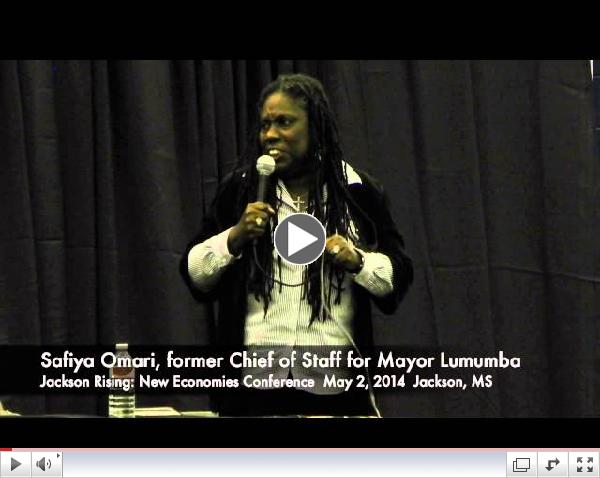 | Free the Land!
Opening Tribute to Chokwe
at Jackson Rising
|
|
Chicago: May 16-17
on Police Crimes
in defense of democracy and
to end racist and political repression
Featuring Angela Davis University of Chicago
International House1414 E. 59th St, Chicago IL 60637
|
 | |
Journal of the Black Left Unity Network
|
|

New CCDS Book Reporting on Vietnam
|
 The new annual edition of our journal of discussion and analysis is now out. More than 130 pages, it includes 20 articles on organizing, racism and the right. Cost is $10 plus shipping. Or get one by becoming a sustainer. Click the title to buy it directly. The new annual edition of our journal of discussion and analysis is now out. More than 130 pages, it includes 20 articles on organizing, racism and the right. Cost is $10 plus shipping. Or get one by becoming a sustainer. Click the title to buy it directly.
|
|
Radical Jesus:
A Graphic History of Faith 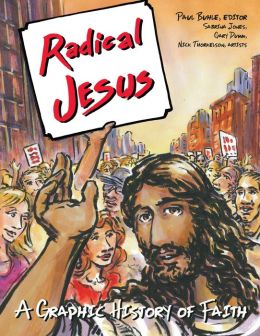 By Paul BuhleHerald Press By Paul BuhleHerald Press
|

Want to Know what CCDS has
been doing...Check it Out!
|
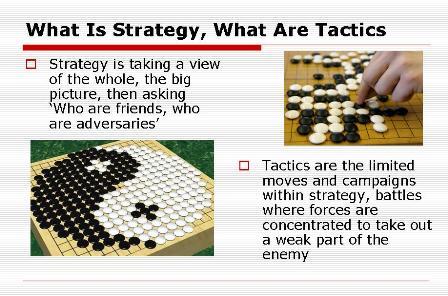 Keep On Keepin' On Keep On Keepin' OnHating the 'Middle Class,' Why Socialists Run in Elections, Strategy and Tactics Slide Slow, Class and Privilege, the Green New Deal ...and other Short Posts on Tumblr by Carl Davidson
|

Edited by Carl Davidson Revolutionary Youth the the New Working Class: The Praxis Papers, the Port Authority Statement, the RYM Documents and other Lost Writings of SDS
Changemaker, 273pp, $22.50
For the full contents, click the link and view 'Preview' under the cover graphic.
|
|
By Randy Shannon, CCDS

"Everyone has the right to work, to free of employment, to just and favorable conditions of work and to protection against unemployment."
- United Nations Universal Declaration of Human Rights, December 10, 1948
I. Introduction
The "Great Recession" that began in 2007 has caused the greatest percent of job losses since the Great Depression of 1929. This crisis is the end of an era of unrestrained 'neo-liberal' capitalism that became public policy during the Reagan administration. The crisis marks a new level of instability with the growth of a global financial elite that targeted US workers and our trade unions after World War II.
|
|
Order Our
Full Employment Booklets
 |
...In a new and updated 2nd Edition
Capitalism may well collapse under its own excesses, but what would one propose to replace it? Margaret Thatcher's mantra was TINA...There Is No Alternative. David Schweickart's vision of "Economic Democracy" proposes a serious alternative. Even more fundamentally, it opens the door to thinking about alternatives. His may or may not turn out to be the definitive "successor system," but he is a leader in breaking out of the box. |
 by Paul KrehbielAutumn Leaf Press, $25.64
by Paul KrehbielAutumn Leaf Press, $25.64 | | Shades of Justice Video: Bringing Down a President, Ending a War |
|
 By Giuseppe Fiori
Verso, 30 pages
|

Essays on Mondragon, Marx, Gramsci
and the Green and Solidarity Economies |
Solidarity Economy:What It's All About

Edited by Jenna Allard, Carl Davidson and Julie Matthaei
Buy it here...
|

- Foreword by Susan Brownmiller
- Preface by Ken Wachsberger
$37.50 + $6 shipping
|
|
Discussion Documents for a Militant Movement

By Don Hamerquist
|
|
|
|
An Invitation to CCDSers and Friends...
 The Cauldrons The Cauldrons
of Class Struggle
Begin to Bubble...
We're the Committees of Correspondence for Democracy and Socialism...Do you have friends who should see this? Pass it on...Do you have a blog of your own? Others you love to read every day? Well, this is a place where you can share access to them with the rest of your comrades. Just pick your greatest hits for the week and send them to us at carld717@gmail.com! Most of all, it's urgent that you oppose war on Iran, defend voter rights, plan for 2014 races now, oppose austerity, support the 'Moral Mondays' in North Carolina, the Congressional Progressive Caucus' 'Back to Work Budget'! We're doing more than ever, and have big plans. So pay your dues, make a donation and become a sustainer. Do it Now! Check the link at the bottom... |
One, Two, Many Sawants? Chicago Activists Announce Socialist Candidate for City Council
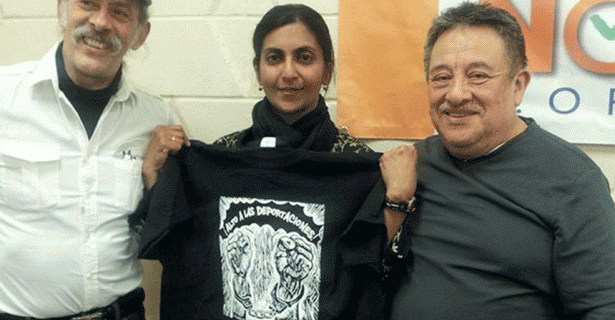
Long-time labor and immigration rights activist Jorge Mújica, left, plans to run for alderman in Chicago's 25th ward
By Andrew Mortazavi
In These Times
Inspired by the victory of socialist Seattle City Council member Kshama Sawant, the Chicago Socialist Campaign launched this winter with the goal of running a candidate for City Council in 2015. On May Day, the campaign announced who that candidate would be: Jorge Mújica, a long-time immigrant rights and labor organizer, who plans to seek election as the alderman for Chicago's 25th ward.
The 25th ward encompasses the Pilsen neighborhood, as well as parts of Chinatown and the University of Illinois Chicago campus. The ward is a diverse one, home to a large Latino/a population, as well as students and urban transplants.
Before immigrating to the United States in 1987, Mújica, 58, was a journalist and community organizer in Mexico. He is now a staple in the Chicago activist community and is currently the strategic campaigners organizer for Arise Chicago, an interfaith labor organization fighting systemic poverty in the Chicagoland area.
Mujica talked with In These Times about his candidacy.
When did you start identifying a socialist, and how do you feel about running under this banner?
I have been a socialist for all of my life. I joined the Communist-Mexican Youth when I was 15 years old.
In the United States, it may sound like socialists are a thing of the past-the term is even an accusation many times. But many immigrants are used to thinking about Leftist political parties participating in the electoral arena.
So to immigrants, to the residents of this ward, it is not strange to look at someone who organizes and identify that person as a Leftist or socialist.
You are announcing your candidacy on May Day, a workers' holiday that has deep roots in Chicago and the fight for an eight-hour workday.
Yes, this was intentional. But at the same time, we have to remember that May Day was an immigrants' day. We brought back May Day in 2006 at the height of the immigration marches. We gave it back to the American workers. People who move from one country to another in order to work-that is an international worker.
How do you hope this campaign can advance the Fight For 15 movement and other labor goals?
Many labor unions have been at odds with the Democratic Party the last few years. The Democratic Party is [seen as] a representative of labor, but they have been getting further away from their real constituency.
[Unions must] stop supporting the "lesser-evil" strategy in elections. With this election, we are giving labor unions a real alternative. We are not just supporting someone who portrays himself or herself as a friend of labor; we are running a labor candidate.
We will also try to run a hands-on campaign. If your wages are being stolen today, come over to the campaign office, and we will help you fight your employer, we will help you file the claims with the Department of Labor....(Click title for more)
|
|
Jackson Rising: An Electoral Battle Unleashes a Merger of Black Power, the Solidarity Economy and Wider Democracy

Photo: Closing session of Jackson Rising By Carl Davidson
SolidarityEconomy.net
Nearly 500 people turned out over the May 2-4, 2014 weekend for the 'Jackson Rising' conference in Jackson, Mississippi. It was a highly successful and intensive exploration of Black power, the solidarity economy and the possibilities unleashed for democratic change when radicals win urban elections.
The gathering drew urban workers and rural farmers, youth and the elderly, students and teachers, men and women. At least half were people of color. About 50 were from the city of Jackson itself, and most were from other Southern states. But a good deal came from across the country, for New York to the Bay area, and a few from other countries-Quebec, South Africa, Venezuela and Zimbabwe.
The major sponsors included Malcolm X Grassroots Movement, the Federation of Southern Cooperatives, Praxis Project, Southern Grassroots Economies Project, US Solidarity Economy Network, and the US Social Forum. Funding came from Community Aid and Development, Inc., Mississippi Association of Cooperatives, Coalition for a Prosperous Mississippi, Fund for Democratic Communities, Ford Foundation, Wallace Action Fund, Surdna Foundation, and the Rosa Luxemburg Foundation.
But to grasp the meaning and significance of this meeting, a step back to see how it began-and why it almost didn't happen-is required.
The conference was the brainchild of Jackson's Mayor Chokwe Lumumba and one group of his close supporters, the Malcolm X Grassroots Movement (MXGM) soon after he was elected on June 4, 2013 and had placed his people in a few key city positions. They had initiated the conference, which was then endorsed by the city council, to help shape and economic development plan for the city and the outlying Black majority rural areas, known as the 'Kush.'--hence the name of the overall project, the 'Jackson-Kush Plan.'
Chokwe Lumumba was rooted in the Black revolutionary organization, the Republic of New Afrika (RNA), which claimed the Black majority areas of several states in the Deep South. He was one of its leading members, and a widely respected civil rights attorney. The RNA also had an economic outlook, a form of cooperative economics through the building of 'New Communities'-named after the concept of 'Ujamaa', a Swahili word for 'extended family,' promoted by former Tanzanian President Julius Nyerere. The new mayor connected this core idea with the long-standing role of cooperatives in African American history, the experience of the Mondragon coops in Spain, and the solidarity economy movement that had emerged and spread from the Third World in recent decades. Together, all these ideas merged in the mayor's project, 'Cooperation Jackson.'
Lumumba's election had taken Jackson's political elite off guard. Making use of the Mississippi Freedom Democratic Party to run as an independent in the Democratic primary, he defeated the incumbent and forced a runoff. Given that Jackson is an 80% Black city, he then won overwhelmingly. So when he died suddenly of heart failure Feb 25, 2014, with his supporters in a state of shock, his opposition moved quickly to counterattack. The MGM, the Peoples Assembly and other pro-Chokwe groups now had two tasks, trying to get Chokwe's son, Chokwe Antar Lumumba, elected mayor while continuing to plan the conference, but with city support on hold.
Lumumba, 31 years old, lost to Tony Yarber, 46% to 54%. Chokwe Antar received over 65% of the Black vote, but the turnout had dropped. The Yarber team immediately moved to fire all the Choke sympathizers from city government, and tried to sabotage the conference. Local rightwing web publications attacked it as "thinly veiled communism."
A Tale of Two Cities
What is behind this antagonism? Jackson is indeed a tale of two cities, on the cusp of two competing visions. Given its demographics, any mayor is likely to be Black, but what that can means is another matter. Just driving around the city gives you a quick glimpse of the problem. While the largest city in the state and the Capitol, replete with major government buildings, the city is eerily quiet and empty. There are a few upscale areas, but also large areas of older, wood-framed housing of the unemployed and the working poor. There are huge fairgrounds, but little in the way of basic industry.
So two paths emerged. One was neoliberal, and aimed at exporting as much of the Black poor as possible, in order to open up wider areas from gentrification attracting the better-paid servants of the businesses that served government. The other was progressive, the Jackson Cooperation plan, which aimed at growing new worker-owned businesses and new housing coops that worked in tandem with the Black farmers of the 'Kush.' It also stressed democratized city services, while creating new alternative energy and recycling startups and also taking advantage of the city's position as a major regional transport hub. It's a conflict not unique to Jackson and shared by many cities around the country. Here's the four points summing up 'Cooperation Jackson': ...(Click title for more)
|

By Dave Johnson
Campaign for America's Future
Senate Republicans filibustered the minimum wage increase. This means the bill doesn't even get a debate, never mind a vote. This is part of their strategy to hold back the economy and then campaign on the bad "Obama" economy.
Meanwhile cities and states are helping their citizens instead of a few greedy billionaires and their giant corporations. Raising the minimum wage not only helps lift people out of poverty, it lowers "safety net" costs like Food Stamps, boosts local businesses and increases income and sales tax revenue.
Seattle is passing a $15 minimum wage, indexed to inflation. The mayor, calling Seattle "an incubator of democracy," is working with businesses to come up with a phase-in plan that takes into account income from tips and employer-provided health insurance.
Near to Seattle, Seatac voters passed a minimum wage last year. In 13 states the minimum increased at the beginning of 2014. New Jersey voters passed a minimum wage increase. Washington, D.C. is raising its minimum wage. Other states are considering increasing their minimum wage.
What About Job Losses?
Republicans say that boosting the minimum wage "costs jobs." (To be fair, they say that anything other than tax cuts for the rich costs jobs.) But study after study shows this is just not true.
1) Companies employ the right number of people to do what is needed to be done. They do not pay people to sit around reading newspapers. Laying off an employee rather than pay a small increase would mean something important to the company isn't going to get done. If a restaurant lays off a waitress or waiter fewer meals will be served. If a store lays off a clerk fewer items will be sold. The reason Starbucks opens outlets down the street from other outlets is to meet the demand without long lines driving customers away.
2) Boosting the pay of millions of people means local businesses have more customers with more money, meaning the stores will have to hire people to meet the increased demand....(Click title for more)
|
By Christopher Hayes
Progressive America Rising via The Nation
April 22, 2014 - Before the cannons fired at Fort Sumter, the Confederates announced their rebellion with lofty rhetoric about "violations of the Constitution of the United States" and "encroachments upon the reserved rights of the States." But the brute, bloody fact beneath those words was money. So much goddamn money.
The leaders of slave power were fighting a movement of dispossession. The abolitionists told them that the property they owned must be forfeited, that all the wealth stored in the limbs and wombs of their property would be taken from them. Zeroed out. Imagine a modern-day political movement that contended that mutual funds and 401(k)s, stocks and college savings accounts were evil institutions that must be eliminated completely, more or less overnight. This was the fear that approximately 400,000 Southern slaveholders faced on the eve of the Civil War.
Today, we rightly recoil at the thought of tabulating slaves as property. It was precisely this ontological question-property or persons?-that the war was fought over. But suspend that moral revulsion for a moment and look at the numbers: Just how much money were the South's slaves worth then? A commonly cited figure is $75 billion, which comes from multiplying the average sale price of slaves in 1860 by the number of slaves and then using the Consumer Price Index to adjust for inflation. But as economists Samuel H. Williamson and Louis P. Cain argue [1], using CPI-adjusted prices over such a long period doesn't really tell us much: "In the 19th century," they note, "there were no national surveys to figure out what the average consumer bought." In fact, the first such survey, in Massachusetts, wasn't conducted until 1875.
In order to get a true sense of how much wealth the South held in bondage, it makes far more sense to look at slavery in terms of the percentage of total economic value it represented at the time. And by that metric, it was colossal. In 1860, slaves represented about 16 percent of the total household assets-that is, all the wealth-in the entire country, which in today's terms is a stunning $10 trillion.
Ten trillion dollars is already a number much too large to comprehend, but remember that wealth was intensely geographically focused. According to calculations made by economic historian Gavin Wright, slaves represented nearly half the total wealth of the South on the eve of secession. "In 1860, slaves as property were worth more than all the banks, factories and railroads in the country put together," civil war historian Eric Foner tells me. "Think what would happen if you liquidated the banks, factories and railroads with no compensation." ...(Click title for more)
|
Black Roots of the Solidarity Economy
 | |
Jessica Gordon Nembhard: Cooperative Economics and Civil Rights
|
|
May Day Marches around the United States
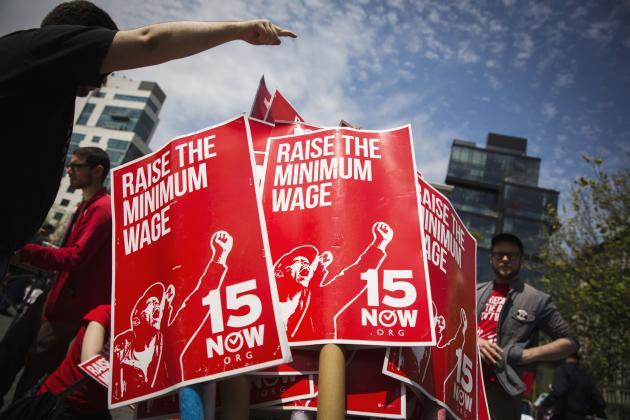
May Day in New York City...
By Liberation News staff In recent years International Worker's Day, which originated in the United States, has been revived as a day of militant working class protest in this country. Following are reports from the streets from Liberation News reporters.
Los Angeles
Thousands of demonstrators joined in the annual May Day march, flooding the streets of downtown Los Angeles to demand an immediate end to deportations and for full immigrant rights. The first of two marches this year was organized by the May Day Coalition, and traveled from Chinatown to the L.A. detention center, remaining entirely peaceful while demanding our voices be heard. The march made a call to keep our families together, focusing on how sweeping deportations leave families broken, terrorize immigrant communities, and disrupt the very fabric of working people's lives.
Present at the march were a spectrum of labor groups, such as the Los Angeles County Federation of Labor (AFL-CIO) and the Clean Car Wash Campaign, immigrant advocacy groups such as the Coalition for Humane Immigrant Rights L.A. (CHIRLA) and the Koreatown Immigrant Workers Alliance, and health advocacy groups such as a community outreach extension of St. John's hospitals which serves the people of South Central. This year also featured a queer contingent made up of LGBTQ health care agencies and advocacy groups, such as the Latino Equality Alliance and St John's hospitals transgender health services.
The second march organized by the Coalition for Full Immigrant Rights began at Olympic and Broadway and marched along the usual route along Broadway in downtown L.A. This march attracted a massive crowd of demonstrators demanding an immediate end to deportations and respect for immigrant workers. Drawing from the traditionally immigrant communities in downtown, the march was incredibly spirited and highly visible, bringing hundreds of onlookers along the downtown strip out into the streets. The passion and vitality of the march resonated in many of the slogans that were heard echoing throughout the heart of the city;?"Obama, escucha. ¡Estamos en la lucha!"?"¡Aquí, aya, la lucha seguirà!"?"¡El pueblo unido, jamas sera vencido!"?"Los immigrantes, ¡somos importantes¡"
In a city like Los Angeles, where a majority of working people are immigrants or are part of immigrant communities, massive demonstrations like May Day hold an incendiary potential to galvanize the working class and demonstrate our tremendous collective power as workers. Demanding for amnesty and "not one more" deportation, the radical spirit of International Workers Day, and the Haymarket Affair of 1886 that it commemorates, is still evident in the struggle for dignity for immigrants in LA. ANSWER Los Angeles and Women Organized to Resist and Defend were proud to be represented at the march in saying "Two million deported and not one more! Amnesty for all immigrants now!"
Washington, D.C.
May Day protests began at 2:00 p.m. with a large march of hundreds of immigrants and families from Union Station to Capitol Hill, across the National Mall and up to the White House. The march was youthful and energetic, led by youth and immigrant families from Maryland and Virginia, and joined by youth from Georgia, Texas, and Arizona with the Not One More Deportation campaign. This May Day protest has followed near daily protests and acts of civil disobedience in D.C. targeting the Obama administration's deportation record.
Protesters, coming out of the shadows as undocumented and demanding an end to deportations, focused their chants and demands on the President. The march ended with the arrest of 12 people who sat down on the White House sidewalk. Hundreds rallied around the White House civil disobedience, holding banners and "Not One More Deportation" signs, playing traditional Mexican Son Jarocho music, and chanting through the evening.
Later in the afternoon, a group of hundreds of protesters, including many students, rallied at Malcolm X Park and marched through the historic Columbia Heights neighborhood to the White House. Columbia Heights-in the midst of a struggle against gentrification-is home to many Latina/o workers, who often stood outside their workplaces and homes to watch the march. All along the march, protesters chanted slogans reflecting worker solidarity and struggle.
Chicago
Over 700 people marched through the streets of Chicago on May Day demanding an end to deportations and full equality now! The march started at the historic Haymarket Memorial and went through downtown Chicago where the march ended at an ICE detention center. Chants of "2 Million 2 Many and Ni Uno Mas," could be heard throughout the streets. Undocumented students and youth, along with partners of people that have been deported spoke out in front of the ICE detention center. Members of Party for Socialism and Liberation handed out the new edition of Liberation, chanted and carried placards saying "Full equality for all immigrants now!"...(Click title for more)
|
What do Palestinians, human rights workers, progressive Israelis, and Israeli settlers have to say about daily life in an occupied land? 
A security barrier in the West Bank city of Hebron, where a Palestinian teenager was killed by Israeli soldiers in March.
By Marilyn Katz
The Rag Blog
April 29, 2014 - The international news coverage of the Israeli-Palestine conflicts often dwells on the disputes among diplomats or dramatic actions in the street. What's missing, however, are the realities residents face as they go about their daily lives.
Even as the United States-prompted negotiations between the country's leaders grow uncertain in the face of an April 29 deadline, those in the region - including human rights workers, elected officials, intellectuals, and government workers - don't anticipate that the personal consequences of occupation will diminish anytime soon.
In the second part of a two-part series, here are the voices of varied groups of Palestinians and Israelis with whom I spoke last fall, as they share their experiences of occupation and how they think it will end.
The human rights workers
Robert (not his real name) is a European who moved to Ramallah, Palestine, six years ago to work with Military Court Watch, a legal aid group that advocates for Palestinians subject to the dual court system Israel has imposed in the West Bank.
Whereas Israelis - whether they live in Jerusalem or in the West Bank - are usually tried by civil courts, Palestinians accused of a crime will most often face the Israeli military courts that have jurisdiction in the two-thirds of the West Bank under Israeli control.
Robert's work primarily focuses on youth - including the 500 to 700 young people, some as young as 12, who are prosecuted by the military courts each year. More than 99 percent of those cases end in conviction. He finds the work compelling, he says, because "for me, the court system provides the clearest case for ending occupation."
"When a fight breaks out between children in Israeli settlements and Arab villages," Robert says, "a summons is issued by the police, and the Israeli child is told to report with his parents to the civil authority [the police station]. He is read his rights, has a lawyer and proceeds to court."
But that isn't the case, he explains, for Palestinian children. After such an altercation, he says, "There is a raid on the [Palestininan] family home in the middle of the night, during which the Israeli Defense Forces (IDF) take the child away to a military encampment and interrogate him, without his parents or a lawyer."
Robert says that with this system in place, it is no surprise that 800,000 Palestinian men, women, and children have been prosecuted in Israeli military courts since 1967. A large percentage of male Palestinians, he continues, will have spent some of their lives in jail, usually as a result of relatively minor crimes.
Ending occupation, Robert feels, is the key to combating this distorted court system.
Ending occupation, Robert feels, is the key to combating this distorted court system. He doubts, however, that the current talks will yield a solution.
"Everyone put faith in the Oslo Accords [finalized in 1993], believing that there would be an independent Palestinian state in three years," he points out. Instead, he says, "The Accords have been used by the Israelis to justify and expand occupation for the past 20 years."
Robert and other rights activists believe that any agreement made by Prime Minister Benjamin Netanyahu would only be one that prolonged occupation, thereby continuing to enable expanded settlements or the dual court system.
When I asked what the solution to occupation would be, he says, "We'll just have to wait for a new generation."...(Click title for more)
|
Book Review: A Fighting Chance 
By Lynn Stuart Parramore
Progressive America Rising via Alternet
May 1, 2014 - There's really a storybook quality to Elizabeth Warren. How did this cookie-baking housewife from Oklahoma end up staring down the most powerful financial powers on Planet Earth, causing them to tremble in their wingtip shoes?
Seemingly conjured up from the fabled town of Mayberry, a place of bake sales and heart-to-hearts with Aunt Bea (she actually had an Aunt Bea), Sen. Warren seems aware of her mythic dimension: at one point in her new memoir, A Fighting Chance, she refers to herself as "Alice in Crazyland." As Alice/Elizabeth heads down the rabbit hole to navigate the money-papered halls of Washington, she uses words like "vile" and "shameful" to describe the evildoing of bankers and corporate predators: she's an outsider from a realm of truer American values who looks upon the upside-down goings on with outraged astonishment, frequently peppering her narrative with her favorite term for disbelief at human folly, an emphatic, "Really?!?"
This Alice among the evil wizards of Wall Street is full of homespun charm and Midwestern wisdom, but in this cynical age, the truly fabulous thing is that her story is true.
Sen. Elizabeth Warren really did grow up among ordinary, struggling people in Oklahoma, and she really did try her very best to content herself with baking brownies and tending her young family before deciding to go to law school. She really did become a crack expert in bankruptcy law and a Harvard professor, and used what she'd learned to challenge the bankers who spent billions purchasing their own facts and unleashing armies of lobbyists to make victims of hard-working, law-abiding Americans.
You get the feeling that Warren's fight against these financial predators is deeply personal. And from her memoir, you can see why: she's fighting for the people who raised her, the neighbors she grew up among, the students in her classes, and the people she has met along the way who have lost their homes, jobs and savings through the deliberate traps set by people who measure their income in human suffering....(Click title for more)
|
|
By Maggie Lee
Variety
A brooding psycho-mystery which pits a confident hypnotherapist against a beautiful patient who claims she can "see dead people," "The Great Hypnotist" reconfirms Taiwanese helmer Leste Chen as an accomplished stylist capable of dressing up B-movie material in a classy package. However, despite lush visuals, a melodic rhythm and a pair of screen-chewing lead perfs, the film is still hamstrung by Ren Peng's screenplay, which not only blatantly steals from "The Sixth Sense" but extinguishes all suspense via an inane twist. Even so, local Chinese auds and Asian genre fans may respond to marketing hype exaggerating the film's mind-bending elements.
Following the vapid but commercially successful romance "Say Yes," Chen reconnects with his horror roots, dormant since his spine-tingling haunted-mansion debut, "The Heirloom," back in 2005. With a bigger budget (approximately $8 million, bankrolled by China major Wanda Media) this time round, he mounts a brisk, tony-looking production, but falls short of first-class genre ranks by failing to elevate the concept of hypnosis into a mesmerizing cinematic experience. Neither mystifying nor demystifying the process, the film simply ignores the subject's vast potential, visualized these sequences as little more than fancy montages or stylized dream sequences.
The film's prologue channels stock elements from Asian horror movies (including a long-haired girl, whispering corridors) to demonstrate the ingenious methods Dr. Xu Ruining (Xu) has developed for treating patients with guilt complexes, while an early anecdote about child trafficking hints at the film's moral - that people are not who they seem. At a lecture, Dr. Xu expounds on the technicalities of hypnotism, guaranteed to leave laymen more confused than ever. Soon afterward, he is enlisted by his academic mentor, Prof. Fang (Lv Zhong), to help Ren Xiaoyan (Mok), a patient who has stumped numerous psychiatrists with her claims of psychic powers.
Ren turns up after dark at Xu's creepy clinic just as something is going bump upstairs. The film wrings some haunting atmospherics from the lusciously-lit Euro-style mise-en-scene. However, as soon as Xu puts Ren under hypnosis, the story changes course and turns into a more routine mystery. As Xu probes into Ren's past as an abandoned child adopted by Hong Kong parents, repressed facts and feelings, including her engagement to fellow orphan Lu Yusong (David Wang) come pouring out. Her visions are shot in striking, de-saturated images by Charlie Lam with a fluidity that recalls Chen's flair for gorgeous tracking shots in his sophomore film, the gay coming-of-ager "Eternal Summer."
A parallel emerges between her obsession - the need to explore not "what" she sees but "why" she can see these startling visions - and Xu's conviction that the ends matter more than his professional means. At one point, when Ren seems to have counter-hypnotized Xu, auds may begin to suspect the whole story is being filtered through an unreliable subconscious. Alas, these intriguing shifts in power balance and clever manipulations of narrative are ruined by the predictable final twist.
Under the Chinese film bureau's restrictions on how supernatural elements can be represented onscreen, it's unrealistic to expect full-blown horrors of a ghostly nature, but the pseudo-scientific point-by-point exposition tacked on to the reveal is so ludicrous and gratuitous it cancels out the relative sophistication of the mentalist sparring that went on before. Not content to just spill the beans, Ren's pedestrian screenplay even smothers the final moments with cloying sentimentality.
Hong Kong singer-thesp and fashion maven Mok (who hasn't starred in anything that fully utilizes her range and sensuality since Zhang Yibai's "Lost Indulgence" in 2008) gives her title role all the layers she can. Sultry at first and softening gradually to reveal vulnerability and neurosis, she never compromises Ren's intelligence and keeps auds guessing as to her motives. Xu, who became a celebrity for directing and starring in China's highest-grossing domestic film "Lost in Thailand," sheds the on-the-nose performance style he displays in comedies like "Lost" and Ning Hao's "No Man's Land" to deliver a calibrated portrayal of hubris. He creates palpable excitement opposite Mok without upstaging her....(Click title for more)
|
Greet May Day 2014 With a Red Resolution...
Become a CCDS member today!
 The time is long past for 'Lone Rangers'. Being a socialist by your self is no fun and doesn't help much. Join CCDS today--$36 regular, $48 household and $18 youth. The time is long past for 'Lone Rangers'. Being a socialist by your self is no fun and doesn't help much. Join CCDS today--$36 regular, $48 household and $18 youth.
Better yet, beome a sustainer at $20 per month, and we'll send you a copy of Jack O'Dell's new book, 'Climbing Jacobs Ladder,' drawing on the lessons of the movement in the South in the 1950s and 1960s.
Solidarity, Carl Davidson, CCDS
|
|
|